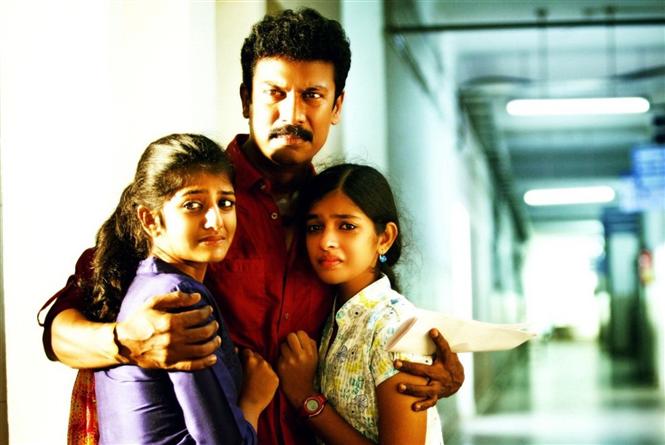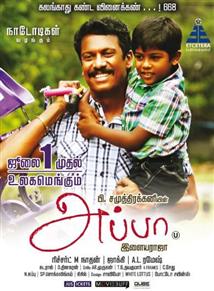Thoughts on Samuthirakani's Appa and why it is important!!!
A Column by Bharath Vijayakumar
Almost all the initial tweets about Appa so far have labelled it as more of a message propaganda than a movie. Furthermore, Wikipedia calls it 'a spiritual sequel' to Saattai. Having found it difficult to relate to a film like 'Saattai' and with these sort of feedback I did enter Appa with obvious apprehensions. And the very first piece of music before the opening shot was similar to that of a 'Thandora'. Co-incidence as it maybe, it definitely prepared me for a list of instructions on 'How to live?'. The sarcasm in my previous statement does hold true even after watching the film but Appa did have its share of pleasant surprises. Now do not get me wrong. The film is indeed a collection of scenes, each telling us in one way or the other on what is right and what is wrong. But it did strike a chord in a way.
If you do get into the form vs content debate, it is quite obvious that Appa does belong to the latter category and a lot has not been delved into trying to get the form into something that might be palatable to someone who is looking for gratification through art. But one cannot simply brush away Appa in this context as I found the film to be better than M.Anbazhagan's Saattai and Pandiraj's Pasanga 2. This film keeps things simpler and there were quite a few things to like about it. Thambi Ramiah's character itself is very much the same caricature that he played in Sattai. While it irritated me to a great extent there, it was more fun here and also more believable. For in Appa, only his wife has to put up with his idiosyncrasies unlike an entire school with all its staff in Saattai. While he was downright evil there, he is very much a good soul over here. It is just that he thinks he is doing the right thing without realizing that he is only playing a spoilsport in the lives of people around him. But his absolute disregard to his son's pleas towards the climax was indeed too much of an exaggeration. It is with stretches like these that the film loses some credibility.
The best part of the film is what it wants to convey about how boy-girl relationships. It makes a point about how inaccessibility to interact with the opposite sex could go a long way in shaping the minds of individuals. A warm handshake and few minutes of interaction is all that is needed to 'wipe away the dirt' from one's mind is what Samuthirakani's character tells his son.While one could play the devils's advocate here and question how can 'an interest in sex' be classified as dirty, it is quite clear that Samuthirakani is not trying to convey that. In his words in the same scene, it is this inaccessibility which sometimes leads a few to view the opposite gender as a mere medium for sexual gratification, which in turn leads to the dastardly acts we see dominating the headlines these days.The point being made here is very important and relevant. Again this is more through dialogue. But given that the father is trying to imbibe these thoughts in his teenage son, dialogue does seem the most appropriate way. You did have a similar father in Vaaranam Aayiram who asks his son to bring over his girlfriends to his home. Let us go back to the form vs content debate. Not initiating a battle between these 2 films but you would agree that for certain people the message is bound to be more loud and clear in Appa. This 'certain people' does not refer to any one of the typical A, B and C centres that the cinema trade classifies its audience into. All kinds of people do exist everywhere and if Appa is able to register this thought in a few, then the existence of this film is very much justified. Whether cinema should educate at the cost of dilution in its form is debatable and a different topic altogether. Because just like many aspects in life, cinema too is relative and what it is to one, it need not be the same to another.
Samuthirakani's wife in the film is another character that is debatable. Happened to read a few reviews which have complained about her character being too one note. But these type of people do exist right! She is actually an interesting character. She does not repent her actions. Even when she comes back to her husband and son, it is actually not out of love. She initially leaves her husband fearing how his way of seeing life would alienate them from the society and result in her being ridiculed. And when she comes back, it is only because she becomes an outsider in her father's home. Even then she does not accept her husband. This happens only when she sees him getting applauded in a gathering. She sees this as social acceptance and hence her U-turn. Love or affection has no place here. This was quite refreshing in a sense that in this type of a film you would expect her to apologize to her husband. But nothing of that sort happens. The consistent tinge of humour in the film was quite enjoyable, be it about the guy with a black t-shirt who keeps following Thambi Ramiah or the character of Namo Narayana whose principle in life is quite simple - Live a life that no one notices and you would not get into trouble.
While Appa did work for me (with obvious limitations including theatrical acting), Sasikumar's monologue at the end was a little too much to take. Even for a lecturing movie of this type, this one came out of the blue. It was as if Sasikumar took on the role of Thambi Ramiah and we the audience had to play the part of his hapless son!!!

